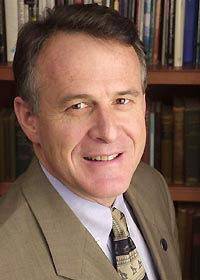For more archives, go to the Advance Archive/Search Page.
Although our mission is broad, it is the research enterprise that distinguishes us as a university. Research must be strengthened as a top priority, through structural and financial support, and incentives for faculty.
Earlier this academic year, on Oct. 10, I addressed the University community and presented my thoughts and intentions in fulfillment of the common task that all of us have undertaken - to shape others and teach them to think with their hearts and minds and to foster and nurture scholarship and creativity in all its forms.
| State of the University Address |
 |
| John Petersen |
For me, research is an item of primacy. Our research efforts must be strengthened; the emphasis must be, and is, on studying, evaluating, and changing for the better the support for these programs.
We must put research back on the University's agenda and assure that it remains high on that agenda. We must encourage research activities - both basic and applied. And we must continue our efforts to make participation in research available to undergraduates, for it is in them that the future of the research enterprise both here and in the society beyond us will be assured.
The national search continues for a vice provost for research and graduate education; this appointment will be one of the most important decisions I will make.
Ian Hart, professor and head of animal science, is serving as interim vice provost and he is addressing - in a proactive, not custodial, manner - some of our most critical research issues: the growth of research funding, the need to focus and expand our research and graduate programs, the animal care issue, and the quality of our research administration and procedures.
My goal is that our research support activities are organized so they deliver both quantitative and qualitative support expeditiously and effectively to our research faculty. It is my intent to have consultants look at our research administration to tell us its strengths and weaknesses and to make recommendations toward assuring that it works for those it serves - those who do research.
There are certain tenets of the University's commitment to research which we hold to be true. Our endeavors should be pathbreaking and thereby foster excellence in research. People should be kept first and because of this, the provision of developmental support for faculty and other researchers is critical to our research success. And we must forge partnerships, crafting and nurturing relationships with all segments of society in order to enhance our research excellence.
A dedication to research excellence is the basis for advanced education and training, consistent with the University's goals. It is critical, therefore, to establish research priorities based on cultural, economic, and intellectual imperatives, as well as needs and opportunities.
There are several aspects that I contend should hallmark research at the University of Connecticut in the future. There should be consistency in approach to our research efforts and to their support.
On matters ranging from issues of major import, such as indirect costs, to the procedural specifics of proposal submission, there must be consistency of approach and particulars and they must be promulgated and communicated. We must have more and more diverse proposal submissions by more faculty.
Faculty will be encouraged to be more entrepreneurial, to be more research-intense and more research-aggressive. There should be incentives for faculty to enter into research rather than disincentives.
We will continue to look at service centers - such as animal care - and institutes, and the procedures under which they function, to assure that the field upon which they play is a level one; that their relationship, one to the other, is the same. We will not put service centers or institutes at risk, because we all know and concur that multi- and interdisciplinary research is the wave we must necessarily ride into the future.
There are many facets of research support but the most important of these is financial - money. Allocation of research monies will be predicated on a varietal of the principle of the greater good. Monies will be allocated to those research endeavors whose outcomes will be positive for all concerned, be they society, the University, the researcher, students, corporate partners, or government.
But be assured that more resources will be infused into our research efforts. Never do I want faculty to think, by perception or in reality, that less resources are going into research enterprises. It should be understood, however, that this university should be in the range of a three or five-to-one ratio in generation of external dollars, compared to what the University puts into research support.
It is not enough to track what monies come into the University, we must pay more careful attention to what the University needs to expend in support of the generation of these monies and to compare inflow and outflow.
Further, the financial mechanisms for research should fit the academic processes; they should not be out of register. One major way in which this fit can be assured is to place some research resources in the hands of deans and department heads, in order that such resources are available to them for making critical research-related academic decisions such as tenure.
We are a university, and as such we live within the broad mission and the wide expectations that being a university carries, such as extent of programs, variety of disciplines, accessibility, and availability. But we are a specific type of university, a research university.
As I have said before, the research descriptor is the significant distinguisher.
